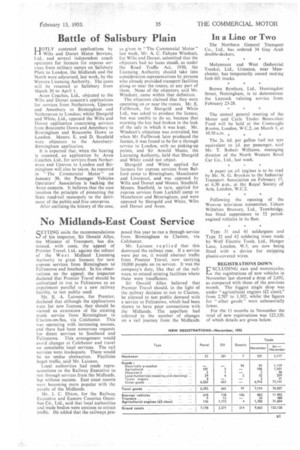No Midlands-East Coast Service
Page 35

If you've noticed an error in this article please click here to report it so we can fix it.
SETT1NG aside the recommendations of his inspector, Sir Oswald Allen, the Minister of Transport, has dismissed, with costs, the appeal of Premier Travel. Ltd., against the refusal of the West Midland Licensing Authority to grant licences for new express services from Birmingham to Felixstowe and Southend. In his observations on the appeal, the inspector declared that Premier Travel should be authorized to run to Felixstowe as an experiment parallel to a new railway facility, to test public need.
Mr. E. A. Lainson, for Premier, declared that although the applications were for new licences, they should be iewed as extensions of the existing trunk service from Birmingham to Clacton-on-Sea, via Colchester. This was operating with increasing success, and there had been numerous requests for direct services to Southend and Felixstowe. This arrangement would avoid changes at Colchester and travel on unsuitable local services. The rail services were inadequate. There would be no undue abstraction. Facilities begot traffic, said Mr. Lainson.
Local authorities had made representations to the Railway Executive to run through services from the Midlands, bin without success. East coast resorts were becoming more popular with the people of the Midlands.
Mr. J. C. Dixon, for the Railway Ex.:cutive and Eastern Counties Omnibus Co., Ltd., said that local authorities and trade bodies were anxious to attract traffic. He added that the railways pro
posed this year to run a through service from Birmingham to Clacton, via Colchester.
I1/41r. Lainson replied that this destroyed the railway case. If a service were put on, it would abstract traffic from -Premier Travel, now carrying 19,000 people on its service. It was the company's duty, like that of the railways, to extend existing facilities where these were 'insufficient.
Sir Oswald Allen believed that Premier Travel should, in the light of the railway decision to run to Clacton, be allowed to test public demand with a service to Felixstowe, which had been shown to have poor connections with the Midlands. The appellant had referred to the number of changes on a rail journey from the Midlands.




















































































